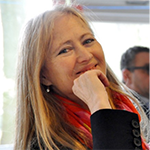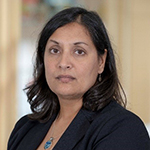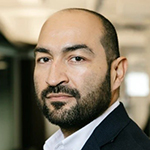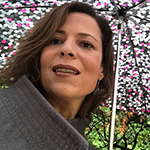Leaving no one behind: How to achieve climate justice?
 March's Forum talk
March's Forum talk
TUESDAY 23 MARCH, 4.30-5.30 P.M. CET
The consequences of the climate crisis are borne unequally as the most vulnerable communities are bearing the biggest burden. On the global scale, the countries with very low carbon footprints are the ones suffering first and most from the effects of climate change. On the national scale marginalised groups including women, indigenous communities, Roma communities are at particular disadvantage. March’s Forum Talk will address the links between climate change and socio-economic inequalities and the ways to protect the most vulnerable groups and achieve climate justice on the global as well as national levels.

Alex TAYLOR
European journalist

 Moderator
Moderator
Alex Taylor is a European journalist. He has produced and presented TV and radio programmes for 30 years, mainly on French TV and radio (France Télévisions, France Inter), but also for international broadcasters (Euronews, TV5 Monde, ARTE, BBC). He was Programme Director for Radio France Internationale in charge of implementing the current 24 hours news format. Parallel to journalism, he has hosted some 1 500 international conferences on a wide variety of topics, especially environmental issues. He has also written a best seller on his passion, languages, of which he speaks (more or less) 7. He also once worked as a camel trainer in a circus.

Sascha GABIZON
Executive Director, Women Engage for a Common Future

Sascha Gabizon is the executive director of WECF International. Sascha Gabizon spent her first years in West Africa, did her Bachelors in European Studies in the Netherlands, and than completed an international business Masters from ESCP/EAP France. She developed the organisation Women Engage for a Common Future – WECF to become an international network of women and environment organisations in over 50 countries, making sure women’s priorities are part of international policy processes on climate, sustainable development and women’s rights. WECF is an accredited observer organisation to the UN Framework Convention on Climate Change (UNFCCC), and supports the Women and Gender Constituency, that coordinates the feminist civil society input. Sascha was a delegate at the 4rd World Conference on Women in China in 1995, that resulted in the historic Beijing Declaration and Platform for Action, where all global governments agreed to a most ambitious path to achieve gender equality, including on women’s leadership in environmental governance. Sascha delivered the civil society opening speech at the United Nations General Assembly’s special Beijing+25 summit in 2020. WECF also facilitates the “Gender-Just Climate Solutions” program together with the UN Center for Climate Technology and Network, that supports inclusive climate action and advocates for the implementation of the Gender Action Plan of the Paris Agreement.

Tahseen JAFRY
Professor, Centre for climate justice, Glasgow Caledonian University

Professor Jafry is Director of the pioneering Centre for Climate Justice at Glasgow Caledonian University. She has accumulated extensive research and development experience over 25 years on the social justice and equity aspects of climate change, climate migration and conflict, gender and poverty targeting, the management of natural resources, the geo-political nature of climate justice discourse and the psycho-social impacts of climate change. Her work has spanned 14 countries (Sub-Saharan Africa, South Asia and Small Island States). She is an experienced manager and co-ordinator of multi-country and multidisciplinary complex consortia for international donors. With a sound academic base she is an experienced lecturer at both the postgraduate and undergraduate courses on environmental management, sustainability and climate justice and supervises thesis to doctorate level. Professor Jafry is an experienced commissioning reviewer for research councils, government departments and aid organisations and is a sought after reviewer for major publishing houses.

Zeljko JOVANOVIC
Director, Open Society Roma Initiatives Office

Zeljko Jovanovic is director of the Open Society Roma Initiatives Office. The office supports Roma in making their voices heard and power felt in policymaking. Besides his work with the Open Society Foundations, Jovanovic is a board chair of the European Roma Institute for Arts and Culture and also a member of the European Council on Foreign Relations and the ASPEN Institute. Before joining the Open Society Foundations in 2006, Jovanovic worked for the Organization for Security and Co-operation in Europe and Catholic Relief Services. He also led a grassroots Roma organization, a community radio, civic and political campaigns, and mentored and trained managers, advocates, and leaders. Jovanovic graduated in law at the University of Belgrade and in governance at the University of Oxford. Jovanovic comes from a family of Roma ethnic background that through a belief in hard work, self-determination, and education, moved from multi-generational extreme poverty to the middle class in Serbia.

Claudia S. DE WINDT
Founding Partner & CEO, Inter-American Institute on Justice and Sustainability

Claudia S. de Windt is an international lawyer and expert in political sciences, from the Dominican Republic. She is a Visiting Scholar at The Environmental Law Institute (ELI), Adjunct Associate Professor at American University, Washington College of Law. She is also a member of the Steering Committee of the World Commission on Environmental Law of the International Union for the Conservation of Nature (IUCN), of the group of experts of the United Nations Environment Programme (UNEP) for crimes that have serious impacts on the environment, and the group of experts in environmental law of the Association Agreement between the European Union and Central America. For almost two decades she worked at the Organization of American States (OAS) Department of Sustainable Development and Secretariat for Multidimensional Security . She directed multiple initiatives on environmental law and its links to public policies, the rule of law, human rights, investment, conflict prevention, security, gender perspective, and the rights-based approach in the 2030 agenda and the Sustainable Development Goals. She advised and participated in numerous political and negotiation processes in the multilateral and hemispheric sphere. Led joint efforts with the executive, legislative and judicial branches to address challenges to environmental security and justice, making significant contributions to environmental legislation, enforcement, compliance and jurisprudence in Latin America and the Caribbean. From 2015-2017, co-Chaired the Green Growth and the Law Working Group of the The Green Growth Knowledge Partnership (GGKP).
